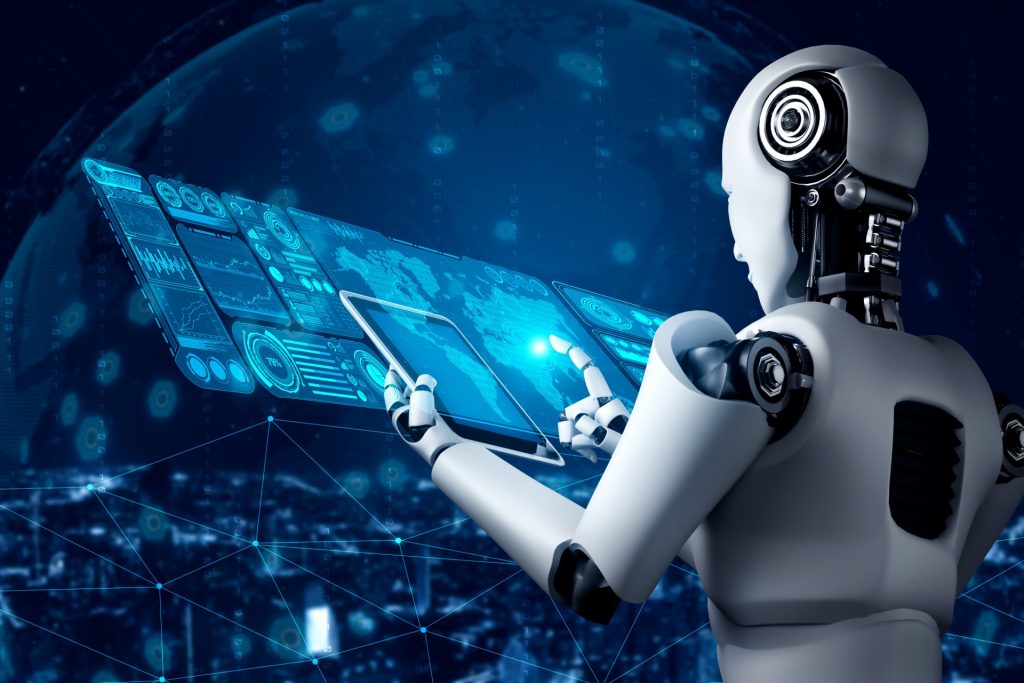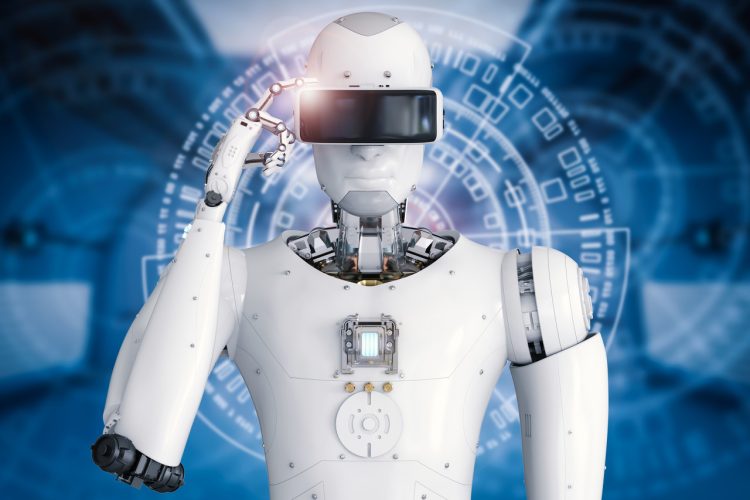Introduction
In the last decade, artificial intelligence (AI) has evolved from a niche technological development into a transformative force across almost every industry. With advancements in machine learning, natural language processing, computer vision, and automation, AI is not only enhancing productivity but also reshaping the competitive dynamics within industries, creating new opportunities for innovation and disrupting established business models. From healthcare to finance, transportation to entertainment, AI’s impact is profound and far-reaching.
AI’s ability to analyze large amounts of data, predict outcomes, automate processes, and enable personalized experiences is enabling businesses to gain a competitive edge in ways that were unimaginable just a few years ago. However, with these advancements come significant challenges, particularly around ethical considerations, job displacement, and data security. The speed at which AI technologies are advancing is outpacing regulatory frameworks, adding a layer of complexity to the evolving business landscape.
This article will explore how AI is reshaping the competitive landscape across various sectors, highlighting its influence on business models, market dynamics, and the broader economic environment.
1. Artificial Intelligence in Healthcare: Revolutionizing Diagnosis and Treatment
a. AI-Powered Diagnostics and Personalized Medicine
One of the most significant transformations AI is driving is in the healthcare industry. AI technologies, particularly in the form of machine learning algorithms and deep learning networks, are revolutionizing diagnostics by analyzing vast amounts of medical data, including medical imaging, patient records, and genetic information. These algorithms can identify patterns that human doctors may overlook, providing earlier and more accurate diagnoses.
For example, AI tools like Google Health’s DeepMind have demonstrated remarkable success in detecting eye diseases and breast cancer from medical images. These innovations not only improve outcomes but also reduce healthcare costs by enabling faster diagnosis and reducing the reliance on expensive procedures. Personalized medicine, powered by AI, tailors treatments to individual patients based on their genetic makeup, optimizing the effectiveness of medical interventions and enhancing patient care.
b. Competitive Advantage and Market Disruption
AI’s integration into healthcare is giving rise to new players in the market, from AI-powered diagnostic companies to telemedicine platforms that leverage machine learning to enhance patient care. Traditional pharmaceutical companies, medical device manufacturers, and healthcare providers are being forced to incorporate AI into their operations to stay competitive.
Furthermore, the data-driven nature of AI also enables businesses to generate actionable insights that were previously unavailable, improving decision-making and creating new revenue streams. Companies that are able to harness AI for drug discovery, health monitoring, and patient treatment will gain significant market advantages.
2. AI in Finance: Enhancing Efficiency and Risk Management
a. AI-Driven Financial Analytics and Trading
In the financial services sector, AI is driving major shifts in both operational efficiency and risk management. AI-powered algorithms are being used for everything from automating trades on stock exchanges to analyzing market trends and optimizing investment portfolios. For example, quantitative trading strategies powered by AI and machine learning models are able to process massive amounts of financial data and make trading decisions at speeds far beyond human capabilities, creating new opportunities for profit and market efficiency.
Moreover, AI is being used to enhance credit scoring and fraud detection by identifying patterns and anomalies in customer behavior. Financial institutions are also leveraging AI to deliver more personalized services, such as customized investment advice and real-time insights into customer spending habits.
b. Competitive Shifts in the Financial Sector
AI is leveling the playing field in finance, allowing fintech startups to compete with traditional financial institutions by offering AI-driven services that were once only available to large banks. Robo-advisors, powered by AI, are democratizing access to investment strategies, giving smaller investors the same tools and resources previously reserved for the wealthy.
Traditional banks and financial institutions are being forced to invest in AI technologies to remain competitive, particularly in areas like customer service, where AI-driven chatbots and virtual assistants are increasingly being used to handle routine queries and transactions. In the long term, this could lead to a consolidation of the banking sector as smaller players that fail to embrace AI risk falling behind.
3. AI in Retail and E-Commerce: Personalizing Customer Experiences
a. Personalized Marketing and Sales Automation
AI is transforming the retail and e-commerce industries by enabling companies to offer personalized experiences for their customers. Machine learning algorithms track customer behavior and preferences, allowing businesses to recommend products and services based on individual shopping habits. This hyper-personalization increases customer satisfaction and drives sales.
For instance, Amazon and Netflix have long been leaders in using AI for personalized product recommendations, but now many retailers are adopting similar AI-driven techniques to enhance customer engagement. AI-powered chatbots and virtual assistants are also improving customer service by providing immediate responses to inquiries and helping customers make purchasing decisions.
b. Competitive Landscape in Retail
As AI becomes more embedded in retail operations, the competitive advantage will shift toward companies that can leverage AI technologies to streamline operations, optimize inventory management, and enhance customer experiences. Retailers that can effectively integrate AI into their sales strategies will attract and retain customers more successfully, while those that fail to innovate risk losing market share.
Smaller, AI-driven companies are also able to disrupt established retail giants by offering more agile, data-driven business models. For instance, AI-powered supply chain management systems help smaller companies better predict demand and reduce costs, allowing them to compete more effectively against larger, more traditional retailers.
4. AI in Manufacturing: Streamlining Production and Reducing Costs
a. Smart Manufacturing and Predictive Maintenance
In the manufacturing sector, AI is playing a pivotal role in optimizing production lines and reducing operational costs. Smart factories powered by AI integrate sensors, robotics, and machine learning to automate complex tasks and improve efficiency. AI can also predict when machinery is likely to break down, enabling predictive maintenance that reduces downtime and maintenance costs.
AI-driven automation can also significantly reduce labor costs and increase the speed and precision of production processes. For example, in the automobile industry, AI-powered robots are increasingly handling tasks like assembly, welding, and inspection, improving both quality and productivity.
b. Disruption in Manufacturing Competitiveness
As AI technologies evolve, companies in the manufacturing sector are forced to invest in automation and smart technologies to maintain their competitive edge. Firms that embrace AI-driven process optimization and real-time data analytics will be able to reduce costs, increase throughput, and respond more quickly to changes in demand.
Smaller manufacturers can also benefit from AI technologies by automating routine tasks, improving supply chain management, and enhancing quality control, enabling them to compete with larger, established players. However, traditional manufacturers that are slow to adopt AI risk falling behind in terms of efficiency and product quality.

5. AI in Transportation: Revolutionizing Mobility and Logistics
a. Autonomous Vehicles and AI in Logistics
AI is revolutionizing the transportation and logistics industries, particularly through the development of autonomous vehicles and intelligent logistics systems. Self-driving cars, trucks, and drones are set to drastically reduce the cost of transportation and logistics operations, offering a new level of efficiency and scalability.
AI is also transforming the supply chain management process by enabling real-time tracking and optimizing delivery routes based on traffic, weather, and demand data. For example, UPS and FedEx are already utilizing AI to optimize their delivery networks, reducing fuel consumption and improving delivery times.
b. Competitive Impacts on the Transportation Industry
The rise of AI-powered autonomous vehicles is set to disrupt the entire transportation ecosystem, challenging traditional car manufacturers, logistics companies, and even ride-hailing services. Companies like Tesla, Waymo, and Uber are at the forefront of this shift, and the race for autonomous technology is expected to accelerate over the coming years.
For logistics companies, AI-powered route optimization and autonomous delivery vehicles could reduce operational costs, increase efficiency, and create new business models. Traditional transportation companies that fail to adopt these technologies risk losing market share to more innovative, tech-driven competitors.
6. The Future: Opportunities and Challenges for Businesses in the Age of AI
The rapid pace of AI innovation presents both opportunities and challenges for businesses across sectors. On the one hand, AI enables businesses to automate routine tasks, increase operational efficiency, and provide highly personalized experiences for customers, creating new competitive advantages. On the other hand, companies must confront the challenges posed by AI ethics, including data privacy, algorithmic biases, and the potential for job displacement.
For businesses to succeed in the AI-driven future, they must:
- Invest in AI technology: Companies that fail to adopt AI risk being left behind by competitors who embrace automation, machine learning, and data analytics.
- Upskill the workforce: As AI technologies automate many tasks, businesses will need to invest in upskilling and reskilling their workforce to ensure employees can work alongside AI systems effectively.
- Address ethical concerns: As AI becomes more integrated into business processes, companies will need to establish ethical frameworks for the responsible use of AI to avoid bias, ensure transparency, and protect user data.
Conclusion
The rapid development of AI is reshaping the competitive landscape across industries, driving innovation, enhancing productivity, and creating new business opportunities. However, this transformation also brings challenges, including ethical concerns, job displacement, and the need for regulatory oversight. Companies that successfully harness AI’s potential will gain a significant competitive edge, while those that fail to adapt may struggle to survive in an increasingly AI-driven world.
As AI continues to evolve, it will undoubtedly create new opportunities and disrupt traditional business models, requiring companies to be agile, innovative, and proactive in adopting these transformative technologies. The future belongs to those who are ready to leverage AI not just as a tool, but as a core driver of business strategy and industry evolution.













































